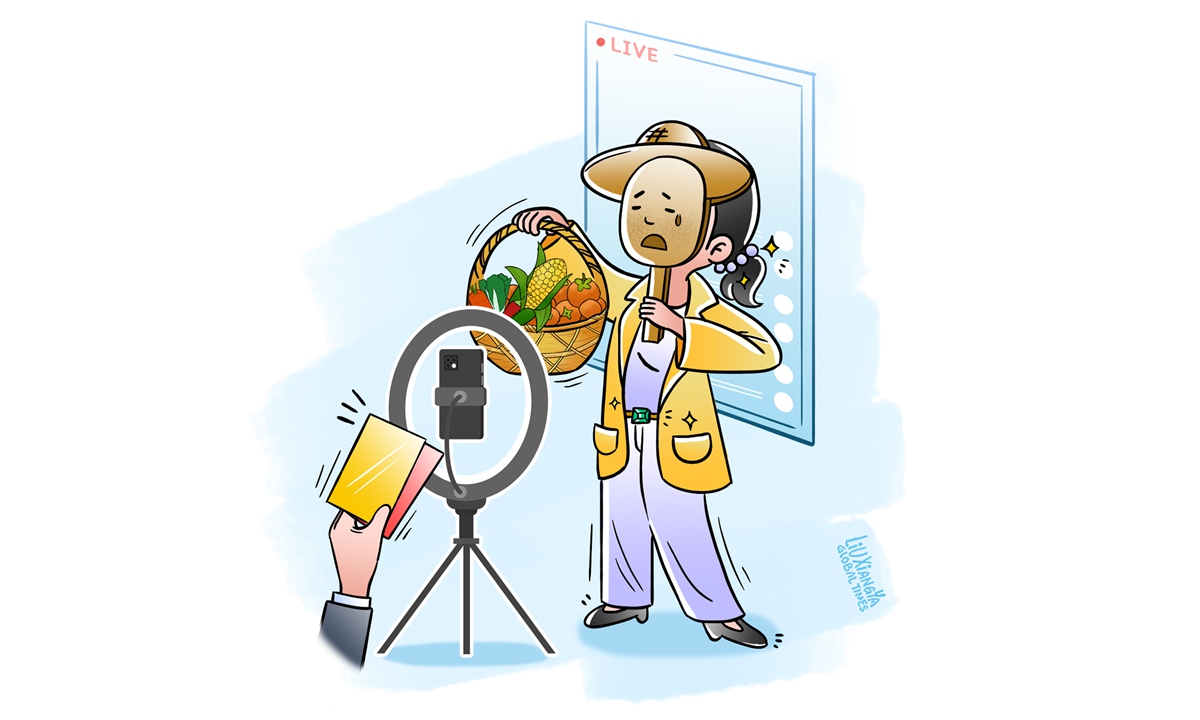ARTS / CULTURE & LEISURE
Cleaning up internet takes collective effort

Illustration: Liu Xiangya/Global Times
An influencer on Douyin, the Chinese version of TikTok, recently openly promoted tomb raiding and even threatened to "dig up the Mausoleum of the Emperor Qinshihuang," triggering an investigation by local police; another internet celebrity rapidly gained popularity by insulting her own mother during a livestream; a girl claimed to be living a frugal life after losing both parents, but in reality, her parents are alive and well, and she frequently visited high-end venues, among other things.Similar occurrences have not been uncommon in recent years. With the booming of the livestreaming industry and short video platforms, many users have garnered significant attention and influence through the internet. They utilize short videos, livestreams and other formats to share their lives and viewpoints, entertain the masses, and gain fame and fortune.
Yet, some internet celebrities have prioritized engagement to the point and even cross ethical lines in the pursuit of views. They fabricate stories, pursue sensational content, promote vulgar and obscene material, disregard laws and regulations and even openly provoke hostility.
Douyin user "Tietou" is one of them. In March 2023, he started posting videos to expose fraud, revealing irregularities in the Sanya seafood market, elderly health products and other products, attracting widespread attention from netizens.
In January, during a livestream, he confessed to soliciting a prostitute, claiming that "the incident happened eight years ago and is beyond the statute of limitations." Midway through, he even told viewers that if likes reach 200,000, he would reveal the details of the case. Subsequently, his accounts on multiple platforms, including Douyin, Kuaishou and Sina Weibo were banned. He had also joked about serious topics such as the "Wenchuan earthquake" during livestreams.
In the wake of the controversy, it's necessary to reflect on why such behaviors persist despite repeated calls for prohibitions. How can such behaviors be effectively prohibited?
Some experts argue that online influencers, by virtue of their large followings and social impact, belong to the category of public figures.
As their influence grows, the statements of internet influencers not only attract attention but also have the potential to become significant forces in shaping public opinion.
While individuals are free to express their viewpoints on social media platforms, this freedom is not unlimited. They cannot publish illegal or irregular information, such as slander, rumors, or information threatened to national security.
According to experts, platforms should take responsibility, raise standards, increase the ability to identify influencers who engage in illegal activities, create vulgar content or violate social norms, and take actions including banning social platform accounts.
Internet monitoring departments should strengthen supervision and tracking of such influencers, while fully using the power of the masses to broaden reporting and rights protection channels.
Establishing and publicly disclosing a list of problematic public online figures and updating it regularly should also be considered.
In April 2022, the Cyberspace Administration of China (CAC) and other departments launched a three-month campaign to "clean up and rectify chaos in the field of online livestreaming and short videos." In July 2023, the CAC issued a notice on strengthening the management of "self-media," requiring restrictions on profit-seeking behavior.
The CAC's efforts in launching specialized campaigns to cleanse online platforms from illicit content are commendable. However, these initiatives must be accompanied by sustained vigilance and collaboration across sectors to be effective.
Platforms should cancel or not grant profit-making permissions to those who create vulgar images, violate public order and social customs, and engage in malicious marketing through multiple accounts to hype social hot topics, according to the notice.
Internet celebrities should also abide by laws and regulations, learn the rules enacted by relevant departments and platforms, understand social red lines, and, while enjoying freedom of speech, shoulder social their responsibilities, guide online public opinion with positive energy, and jointly create a clean and healthy online space.
If "immoral" behaviors exceed the public's line of acceptance, even if legal responsibility is not pursued, it should not become the subject of public dissemination.
Regulatory departments, platforms and the whole society should exercise stricter supervision, strengthen correct guidance and ensure that internet celebrities' words and actions are subject to rigorous review procedures to uphold social order and public interests.
To eradicate chaos on the internet, a most critical and long-term solution is to form society-wide conscious prevention and resistance against vulgar and sycophantic bad information.
While ensuring freedom of internet celebrity discourse, it is also necessary to maintain online order, find a balance between the two, and ensure that the internet becomes a positive force for promoting social progress.
In conclusion, the unchecked misconduct of influencers poses a threat to online spaces. To address this issue, concerted efforts from platforms, regulators and the public are indispensable. By upholding ethical standards and fostering a culture of accountability, we can reclaim the digital sphere as a positive force.
The author is a reporter with the Global Times. life@globaltimes.com.cn

